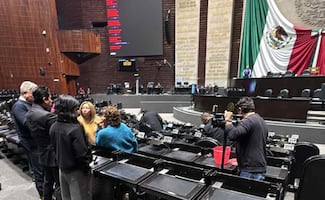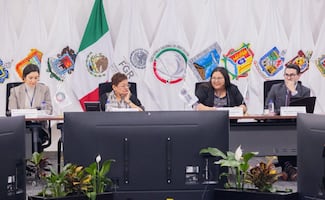Más Información

Detienen a "El Guayabas" junto a otros líderes huachicoleros en Puebla; aseguran más de 40 mil litros de combustible

Goteras interrumpen sesión en la Cámara de Diputados; ponen cubetas para proteger curules y micrófonos

Muertes violentas de mujeres serán investigadas como feminicidio; Secretaría de las Mujeres lanza estrategia nacional

"Cuba es un paciente desfalleciente"; Ricardo Pascoe examina en Con los de Casa el impacto regional de Trump
One of us is a longstanding politician and a former presidential candidate, the other a longstanding scientist and environmentalist. Unlikely coauthors these days, many would think. What moved us to write this piece together is that, as with billions of other human beings around the world, we want a healthy planet on which our children, grandchildren, and nature can thrive, or, at the very least, a planet like the one bequeathed to us by our own parents.
We share a profound conviction that climate crisis — the challenge of our times —can and will be solved.
The climate debate has somehow turned into an argument among the deaf: on one side, those who disregard the scientific evidence and warnings as alarmist; on the other side, those who believe the evidence is compelling enough that the world must act decisively and without further delay.
We don’t judge on which side you stand. But we can’t afford to continue fighting against each other. Please, let's think for a moment: what if the science is correct? What are the consequences of not acting now—while we still have time? Is inaction worth the risk? There is no need to hit you with a barrage of more statistics on the climate crisis . However, we appeal to those of you who distrust climate change science to instead trust your own preservation instincts.
We are all in the same boat here on planet Earth . And it’s a boat carrying us all to the same destination, indiscriminately, whether you are from a developing or a developed nation , a highly populated continent or Antarctica. In the end, being rich or poor won’t matter. Of course, as with all journeys, the quality of the trip and the place where you’ll arrive will depend on how much you are willing to invest in preparing for the ride and paying for the ticket.
For decades, the response to climate change hasn’t figured prominently in the political agendas of governments and multilateral institutions. One unintended result of many years of this inattention is that we’ve weakened, and in some cases even eliminated, the tremendous adaptive potential of nature and ecosystems to confront the most insidious impacts of climate change.
The next stop for our own boat is on July 9 and 10 when we will attend a working session of the Global Commission on Adaptation in Dhaka , the capital of Bangladesh , one of the countries that is most vulnerable to the impacts of climate change. Hosted by Prime Minister Sheikh Hasina , the Commission will finalize its landmark report Accelerating Adaptation: A Global Call to Action , which outlines a set of action-oriented recommendations. Our task in Dhaka is to persuade the other Commissioners of the fundamental role of nature-based solutions in climate change adaptation , solutions that are not only doable but also within our arms' reach.
The Commission's road map to action will be presented to the UN Secretary-General Climate Summit i n New York in September, where the international community will be asked to mobilize the necessary resources to spearhead positive action. Success in New York will depend on consolidating a strong coalition of governments, members of the private sector, multilateral institutions, and civil society: a coalition the world has seldom seen before. A coalition willing to turn the page on our grievances and ideological differences, for once, and with a clear purpose—to ensure our survival and that of the hundreds of millions of unborn children of future generations.
Our choice is unequivocal: if we don’t protect nature, there will be no solutions that matter for humans to adapt to the impacts of climate change . The question is, are we up to the challenge? Our answer is an uncompromising yes. What is yours?
Omar Vidal was deputy coordinator of the Global program of action for the protection of the marine environment from land-based activities, UN environment program; and director-general of WWF-Mexico, 1995 to 2017
Noticias según tus intereses
[Publicidad]
[Publicidad]













